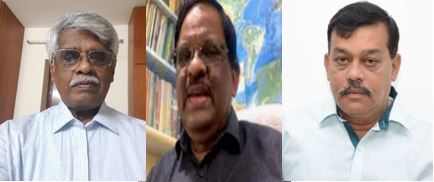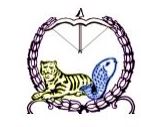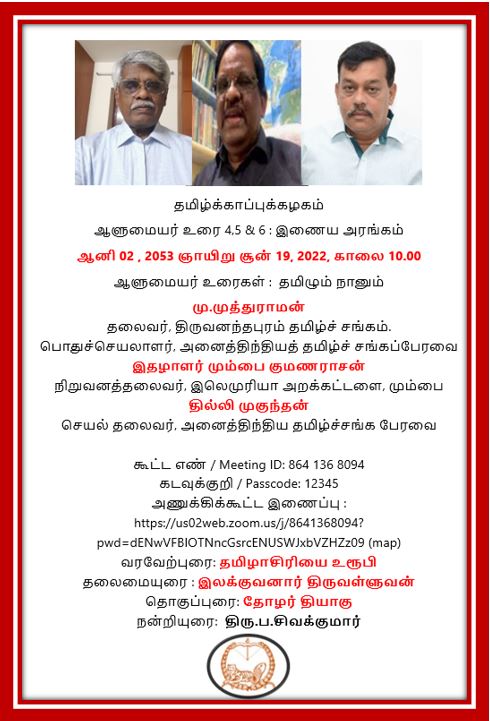20th International Online Conference on Thirukkural and UNESCO for World Peace
https://zoom.us/j/94899339981?
Meeting ID: 948 9933 9981
Passcode: 112233
20th International Online Conference on Thirukkural and UNESCO for World Peace
(Universal significance on Tamil Language - 2/3)
ETYMOLOGICAL DICTIONARY ON THE RELATIONSHIP BETWEEN TAMIL
LANGUAGE
AND THE INDO-EUROPEAN FAMILY OF LANGUAGES.
A Project of universal significance on Tamil Language
Dr. G. John Samuel
3/3
Although there are many etymological dictionaries for various
Indian and European languages, the present etymological dictionary proposed
by the Government of Tamil Nadu is unique in its scope, methodology and
execution. Like the Dravidian Etymological Dictionary which was very
meticulously prepared by two great scholars Prof. Thomas Burrow of Oxford
and Prof. M.B. Emeneau of California Berkley University, the present
etymological dictionary will trace the etymology of various Tamil lexical items
and their semantic content in different languages. But the uniqueness of the
Tamilnadu Govt.’s Etymological dictionary is that it deals with two different
families of languages which belong to totally different geographical areas and
spoken by different ethnic groups of different origins. The common shared features,
and genetic relationship among them are very less - the commonness arose mainly
out of constant commercial and cultural contacts existed in different ages from
the pre-historic period to the present day of science and technology.
This dictionary will also serve as basic refence material for the
study of the external history of the Tamils which is almost a neglected area of
academic pursuit due to lack of source material. Being a very potential sea
- faring race of the world, Tamils had extensive commercial contact with
various countries through large number of port cities in many parts of
Tamilnadu, which include Pūmpukār of the ancient Chola empire, the Koṟkai of
the Pandia kingdom, the Toṇṭi of the Chera dynasty and Māmallapuram of Toṇṭai maṇṭalam.
This dictionary will be an authentic source to international scholars to
study the external history of the ancient Tamils, their trade routes and their
status in the history of the globe.
We hope that the expert committee comprising of good native and
foreign scholars will draft all details regarding the execution of the project.
A word corpus consisting of all the Tamil words found in all the existing and
non – existing languages of the world from the historic past to the present day
should be prepared with meticulous care with the support of scholars belonging
to various linguistic groups. This word corpus should be carefully analysed to
see whether the similarities existing among them are only accidental or they
are real cognates. All accidental similarities should be avoided. The data
should be presented both diachronically and synchronically using comparative
methodology wherever necessary. All historical links should be presented in
each occurrence in different languages. People who can read ancient Coptic, and
other rare documents should be employed so that no single data is left out.
It is our fond hope that the Tamil words found in Indo-European
languages should be analysed from the perspective of historical principles. The
approximate period of entry of each word with the social background and the
changes that took place in the formal lexical structure and semantic content
through the ages should be clearly indicated. There may be semantic expansion,
or specification, or elevation or degradation and some times such words may
become archaic or completely extinct. All this should be specifically marked
since this will provide good data for excellent studies in future on the
external history of our mother tongue.
As already mentioned Indio - European is a very complicated vast
area of study with more than ten substratum. Consequently, it may be very
difficult to handle the enormous data simultaneously in a single work. For the
sake of presenting the data with clarity and handle the project efficiently, it
is better to deal with each substratum as a separate family. Some says, Indo-Aryan is a substratum of Indo-European and the substratum Indo-Aryan is
spoken approximately by 70% of people in India and considerable number of
Sinhalese of Sri Lanka. But this is only a tentative statistics by our linguists. This may vary when we take into account. Marathi, Sindhi and few other languages which share close genetic relationship with the Dravidian family of languages. It may be around less than 50% when we undertake good field research. The first part of our dictionary can deal with Tamil
and Indo - Aryan family and the subsequent parts can deal with Indo - Iranian,
Celtic, Germanic, Armenian, Hellenic and so on.
There shall be few other volumes which can deal with Ural - Atlaic
family comprising of Japanese, Korean, Hungarian etc. Separate parts can be
allotted to present Tamil and African languages such as Kanōri etc. and Tamil
and Mangoloid group. The span of time for the preparation of these volumes may
be more than what is envisaged and the budget may be little more heavy; But it
is worth doing and worth spending for a great cause which has no parallel under
the vast sky. This will transform our mother tongue as வானம் அளந்த தமிழ் and வையகம் அளந்த தமிழ். All glory on this great
project go to our Hon'ble Chief Minister who has dedicated himself to bring
global status to our mother tongue, our hoary culture and our society.
Dr. G John Samuel, Director
Institute of Asian Studies
Sholinganallur
Chennai 600 119
Tamilnadu. S.India

தமிழ்க்காப்புக்கழகம்
ஆளுமையர் உரை 4,5 & 6 : இணைய அரங்கம்
ஆனி 02 , 2053 ஞாயிறு சூன் 19, 2022, காலை 10.00
ஆளுமையர் உரைகள் : தமிழும் நானும்
மு.முத்துராமன்
தலைவர், திருவனந்தபுரம் தமிழ்ச் சங்கம்.
பொதுச்செயலாளர், அனைத்திந்தியத் தமிழ்ச் சங்கப்பேரவை
இதழாளர் மும்பை குமணராசன்
நிறுவனத்தலைவர், இலெமுரியா அறக்கட்டளை, மும்பை
தில்லி முகுந்தன்
செயல் தலைவர், அனைத்திந்திய தமிழ்ச்சங்க பேரவை
கூட்ட எண் / Meeting ID: 864 136 8094
கடவுக்குறி / Passcode: 12345
அணுக்கிக்கூட்ட இணைப்பு :
pwd=dENwVFBIOTNncGsrcENUSWJxbVZHZz09 (map)
வரவேற்புரை: தமிழாசிரியை உரூபி
தலைமையுரை : இலக்குவனார் திருவள்ளுவன்
தொகுப்புரை: தோழர் தியாகு
நன்றியுரை: திரு.ப.சிவக்குமார்


உலகத்தமிழராய்ச்சி மன்றம்(IATR)
இலிங்கன் தொழில் மேலாண்மைப் பல்கலைக்கழகம்
சார்சா, ஐக்கிய அரபு அமீரகம்
11ஆம் உலகத் தமிழாராய்ச்சி மாநாடு
ஆய்வுச் சுருக்கம் சேர வேண்டிய நாள்: புரட்டாசி 13, 2053 / 30.09.2022
ஆய்வுக் கட்டுரை மின்னஞ்சல்வழிச் சேர வேண்டிய நாள்:
பங்குனி 17, 2054 / 31.03.2023
மின்வரி: abstract2023@gmail.com
தொடர்பு முகவரி :
9, சாரங்கபாணி தெரு, தியாகராய நகர்,
சென்னை 600 017
பேசி 28340488, 96770 37474, 98422 81957, 96000 07819
www.iatrinternational.org / 11worldtamilconf@gmail.com
ஆன்றோர்(தான்சிரீ) த.மாரிமுத்து
தலைவர்
உலகத் தமிழ் ஆராய்ச்சி மன்றம்